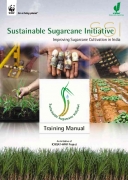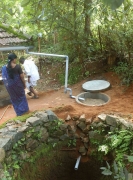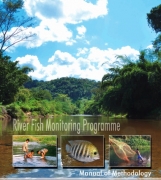/sub-categories/news-and-articles
News and Articles
Irrigation water management for food security in India: The forgotten realities - Paper by IRAP
Posted on 09 Jun, 2010 06:14 PMIn this paper, the authors examine the current debates around India's water crisis and its implications for food security in the country. The paper takes a critical look at the recent official assessments of groundwater exploitation in India in the context of these debates.
The paper proposes that there is a need to make a qualitative assessment of the magnitude of food security and water management challenges facing the country. It argues that two important factors drive the agricultural growth and food production in India. These include access and availability of arable land and water resources, which need to be examined and analysed with particular reference to their regional variations, to get a true understanding of the situation.
Sustainable Sugarcane Initiative - Improving Sugarcane Cultivation in India - Training Manual developed by WWF India and ICRISAT
Posted on 09 Jun, 2010 01:25 AM Sustainable Sugarcane Initiative (SSI) is an approach to the cultivation of sugarcane, that can reduce inputs - water, chemical fertilizers, seed material and farm space - while improving sugarcane production significantly. It also reduces crop duration and provides a longer period of the cane crushing season to the sugar industry.
Sustainable Sugarcane Initiative (SSI) is an approach to the cultivation of sugarcane, that can reduce inputs - water, chemical fertilizers, seed material and farm space - while improving sugarcane production significantly. It also reduces crop duration and provides a longer period of the cane crushing season to the sugar industry.
This farm-based approach (as opposed to crop-based) also gives farmers options to grow intercrops, such as pulses to improve their income. Most importantly, SSI reduces the overall pressure on water resources and contributes to recovery of ecosystems. It conserves soil moisture, thereby allowing for growing of dryland crops in the same region.
SSI is inspired from the successful approach of System of Rice Intensification (SRI) paddy cultivation, which like SSI, originated from farmers and civil society to improve agricultural productivity while reducing pressure on natural resources.
Clean drinking water using low-cost purification plants - A case study from the work of IFMR Trust and WaterHealth India in Andhra Pradesh
Posted on 08 Jun, 2010 11:49 PMThis field report describes the work of WaterHealth India (WHI), in organising safe drinking water using low-cost water purification units, in several villages of Andhra Pradesh. The work was taken up with financial support from IFMR Trust.
Vinjinampadu village in Guntur district, Andhra Pradesh, is one of the villages where WHI worked to establish the unit. The village had lacked potable water supply, because of which its people suffered from a range of water-borne diseases. The situation was similar in many of the other villages in which WHI initiated this work.

Women empowerment - Jalswarajya project launches 'Jalmitra' initiative in Maharashtra
Posted on 08 Jun, 2010 08:54 PMWomen ‘JALMITRA’ spanning awareness on O&M
Article by - Prabhakar Mishra, IEC Specialist, Jalswarajya Nagpur.
Inroduction
Draft of “The Dam Safety Bill, 2010” approved
Posted on 08 Jun, 2010 06:24 PMAs per the Press Information Bureau's press release, the Union Cabinet has approved the proposal of the Ministry of Water Resources for enacting The Dam Safety Bill, on May 13 2010. The Bill is to be introduced in the Parliament.
The main objectives of the legislation are:-
• The new legislation will help the States in adopting uniform dam safety procedures which shall ensure safety of dams and safeguard benefits from such dams.
Dams on Himalayan rivers: How good is the science?
Posted on 08 Jun, 2010 05:38 PMThis brief article by Prof Jayanta Bandyopadhyay in the May 16-31 2010 issue of Business Economics magazine, highlights the recent plans of the central and state goverments of constructing a large number of dams on Himalayan rivers. Environmentalists continue to consistently argue against the construction of dams that are built without respect for ecological sciences and warn that this could lead to increase in disasters in the fragile Himalayan region.
"We have to accept diversity of knowledge to manage water wisely": Interview with Prof Jayanta Bandyopadhyay on business economics
Posted on 08 Jun, 2010 11:48 AMProf Jayanta Bandyopadhyay, Professor and Head, Centre for Development and Environment Policy, IIM Calcutta, speaks to Bappaditya Chatterjee of Business Economics , on the consequences of global warming and climate change on India's water resources, in the magazine's June 1-15 2010 issue.
Mazhapolima Participatory Well Recharge Programme - Concept Note and Process Document (2009)
Posted on 07 Jun, 2010 07:27 PM Mazhapolima is a community based well recharge programme, initiated by the Thrissur District Administration in collaboration with the Panchayat Raj Institutions in the District, and implemented by networking NGOs/CBOs, households, departments and agencies, research institutions, private sector and all other key stakeholders, who are either a water user or a water provider/planner.
Mazhapolima is a community based well recharge programme, initiated by the Thrissur District Administration in collaboration with the Panchayat Raj Institutions in the District, and implemented by networking NGOs/CBOs, households, departments and agencies, research institutions, private sector and all other key stakeholders, who are either a water user or a water provider/planner.
Diversity of approaches and implementation arrangements according to location specific needs centered on sustainable outcome and service levels are the underlying tenets of the programme. The programme envisages recharging of about 4.5 lakh open wells in the district to ensure sustainable access to water.
River Fish Monitoring Programme - Manual of Methodology by Kerala State Biodiversity Board
Posted on 07 Jun, 2010 03:33 PM Measurement of riverine biota, particularly benthic macroinvertebrates (such as crustaceans and aquatic insects) and fish, has become a widely accepted method of identifying the structural or functional integrity and the overall health of a riverine system. This manual from the Kerala State Biodiversity Board (KSBB), describes in detail the field procedures to be followed in such fish monitoring/measurement surveys, conducted for riverine ecological systems.
Measurement of riverine biota, particularly benthic macroinvertebrates (such as crustaceans and aquatic insects) and fish, has become a widely accepted method of identifying the structural or functional integrity and the overall health of a riverine system. This manual from the Kerala State Biodiversity Board (KSBB), describes in detail the field procedures to be followed in such fish monitoring/measurement surveys, conducted for riverine ecological systems.
KSBB has taken up this manual publication effort, in the conxtet of a state-wide fish monitoring programme, that aims to survey all the 44 rivers of Kerala with the involvement of resource persons from local colleges, research institutes, experts and fisherpeople community.
Safe drinking water for all using a portable low cost solar disinfection unit - A research paper
Posted on 07 Jun, 2010 02:23 PMThis paper by A Jagadeesh of RMK Engineering College, describes the design and testing of a portable, low-cost, and low maintenance solar disinfection unit, that can provide potable water. This system was tested with bore water, well as well as with waste water. In 5 hours, the unit eradicated 99.99% of the bacteria contained in the water samples.
This unit can provide about 6 liters of pure drinking water and larger units can be fabricated for providing safe drinking water at a community level.